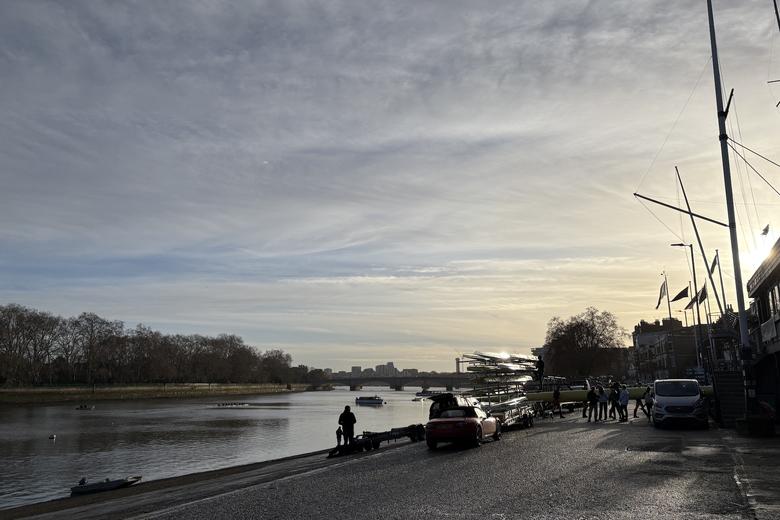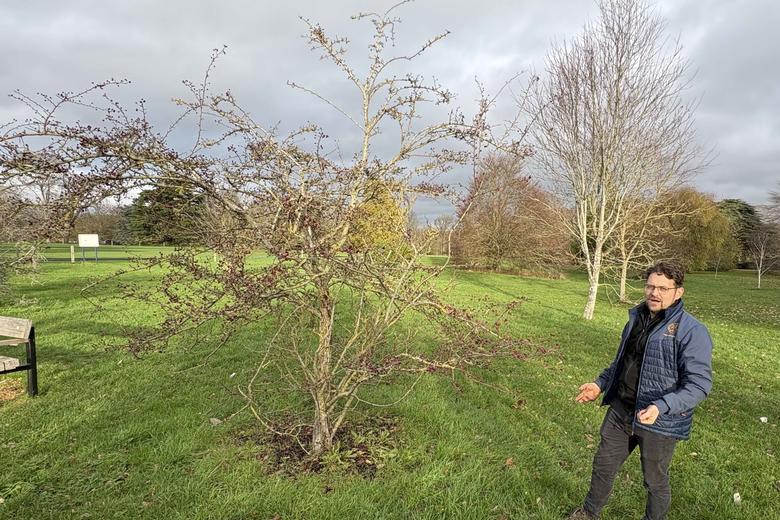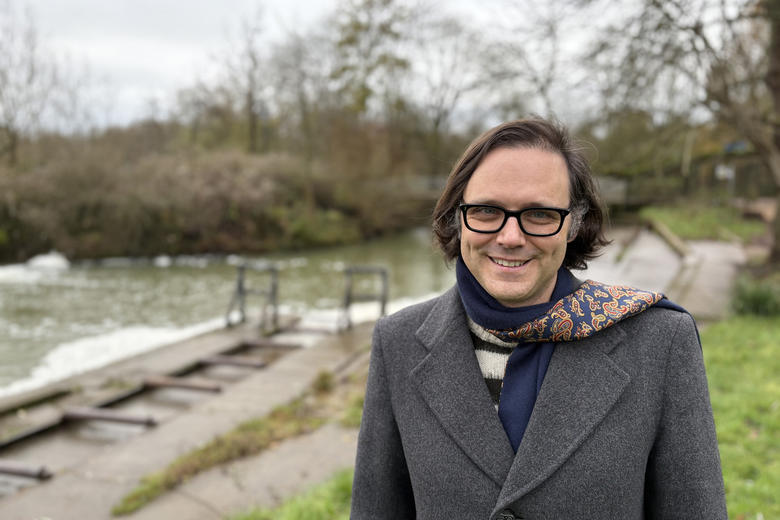ALUMNI STORIES: 'A CAREER IN SPORTS JOURNALISM IS AN EXCITING LIFE BUT NOT A LAZY OR EASY LIFE.'

ALUMNI STORIES: 'A CAREER IN SPORTS JOURNALISM IS AN EXCITING LIFE BUT NOT A LAZY OR EASY LIFE.'
Jen O'Neill (Keble, 1993), Editor of Women's Football Magazine She Kicks gives tips for a career in sports journalism
Published: 24 August 2023
Author: Zoe Burns
Share this article
Tell us about your journey to where you are today?
Well it kicked off with a large dollop of serendipity. While I was studying geography at Oxford I was selected for the English Universities team (representing students across the country) and a year after my graduation, one of the coaches (Dr Colin Aldis, University of Bath) was contacted by a North East-based start-up publisher interested in producing a magazine about the women’s game. ‘Could he suggest any suitable candidates?’ That was early 1998 and here we are 25 years later!
How important a part did football play during your time at Oxford? Why is it important for students to get involved with activities and interests outside of their academic study?
Being good at football was likely one of the primary reasons I was offered a place from the outset and it also proved to be my lifeline during my time at Oxford. I’m pretty sure that without it I would not have seen out the three years of my degree because it provided a balance and an escape from the lack of confidence and ‘fish out of water’ insecurities that plagued my academic existence. It’s important to be honest about these things and that not everyone is always happy or comfortable during their undergrad years.
I had fantastic friends within college and enjoyed playing a range of college sports too but the University football squad contained a number of skilled players and while some were from overseas, most were from state schools, from the ‘provinces’ like me. Activities and other interests break you out of the college bubble, quite literally in the sense that you spend time at other colleges and travel away from Oxford for matches and in my case, I made amazing memories, worldwide connections and friends for life.

How did you first get into football?
As a six-year-old, playing with my neighbours, who were all boys. We grew up playing football together (though there were no teams for me to be part of). I’d play keepie-ups on the sidelines of their junior matches, waiting until we could all play together again. We were still having the odd kickabout even when I was home from Oxford! Of course I played hockey and netball at school but you can’t play that at home, especially on your own?!
I first started playing for Sunderland when they created a women’s set-up (though many of us were only 12-15 years old) in 1989-90. I ‘retired’ after we were promoted back into the top flight in 2005. It was an exciting and talented team that contained some future internationals in young Rachel Furness, Steph Houghton, Jill Scott and Carly Telford. Wonder what happened to them?!
After leaving Oxford, how did you make the first step into sports journalism? Did you always have this career path in mind, or was there ever another career direction that you nearly took?
My friends and teachers, A Level lecturers etc, had always suggested I go into writing. I guess I could pen a funny email, string other stuff together and would help with reporting etc for Sunderland. I suppose it was a notion, a possibility perhaps but nothing was ‘planned’ in that respect. I’ve since been a columnist and match reporter for The Times newspaper and the Metro, a co-commentator for many years with Eurosport and on BBC Radio 5 Live. I think these days I prefer the immediacy of talking about football and delegating and directing others in their writing, rather than the day-to-day adrenalin rush of ‘on the whistles’ and news gathering. I’ve never been ‘nosey’, confident or competitive enough to be a ‘proper’ journalist! I still thoroughly enjoy conversations/interviews with sports people though - I feel very fortunate having the access to do that.
Can you tell us about a typical day-in-the-life working on She Kicks magazine. What are you working on at the moment during the Women's World Cup?
The build-up to the tournament was pretty hectic with our 80 page preview, and helping The Football Supporter’s Association produce their ‘Free Lionesses’ fans’ guide as well as radio preview interviews and trying to keep abreast of the news in the lead up to kick off.
Whilst in Australia I tried to watch as many games as possible, be that in the stadiums in Sydney and Brisbane, in the fan parks or on TV. There’s frequent media conferences and MD-1 (the day before games) and post-match activity and the volume of radio and TV requests increases as England progress in the tournament (My trip to the World Cup was supported by NuCalm so there was content requirements from them too).
We had a tournament review magazine issue to keep on top of, day-to-day work admin, lots of people to catch up with, domestic football in the UK does not stop and you have to enjoy some down time, take in the atmosphere and see a few sights while you can as well!

What would be your top three tips for Oxford alumni wanting a career in sports journalism?
- Do not take no reply as a no. Editors, press officers, agents, producers, you name it – people are busy – so no reply is not a rejection.
I do not know of anyone who would be irritated if someone contacted them repeatedly and politely reminded them or put their query/suggestion forward again. The worst that can happen is I say, 'No thanks.' Conversely, I’m actually likely to be more impressed by patient persistence. - Develop your own style, don’t try and be a copycat. Some commentators, for example, sound like they are trying to sound like someone else they have heard. Be yourself. Authenticity is a magnetic quality and passionate and knowledgeable viewers/listeners/readers can often see through those who are faking it. And draw on areas you have particular expertise and access. Having in-depth knowledge and being the best at reporting on a niche sport or area of sport may open more doors than being really, really good at generic sports reporting.
- Know your worth. Yes, gain experience and contacts and be willing to offer your time and skills in supporting organisations that may need free/cheap content but only do that for as long as you are getting something of value in return. Don’t be afraid to ask for recompense or assistance for work you do, be honest and reasonable and expect that in return. A career in sports journalism is an exciting life but not a lazy or easy life.

You're co-author of the Official FIFA Women’s World Cup books 2023, 2015, and 2019. How far in advance do you start preparing the books, and which part of the production do you enjoy the most?
Myself and two colleagues work together on these projects and produce the copy and a suggested picture list for the publishing company who determine pagination, word count and schedule. This World Cup is an expanded tournament with 32 teams and therefore more pages and content to produce.
We had three deadlines. The first was in early October 2022, shortly after we signed the contract, so we found ourselves writing some team profiles (England, for example) nine months before the tournament kicked off! The final book was completed in January with only minor text tweaks permitted up to that point. So there’s been lots of angst and eye-rolling at injuries, coach changes and other news stories since the autumn.
You learn so much about a nation’s team or a player’s back story, which sadly doesn’t make the final edit. Myself and Catherine Etoe share the writing (we split confederations and teams and star players between us) and Natalia Sollohub is our fastidious fact-checker, so I love reading what Catherine has submitted (particularly the star player profiles). And seeing the final product is satisfying and surprising as you often forget the pain of the months of effort and quite a bit of the content that went into it!
How have She Kicks been covering the Women's World Cup?
I was in Australia covering the tournament, taking in games in Sydney and Brisbane, and trying to see as many nations playing as possible.
Many of us UK-based journalists were tipping Germany and/or the USA to win, though I’ve always wondered what impact playing in the Southern Hemisphere and on ‘the other side of the world’ would have. Now that there are so many more opportunities for players from all over the world to play full-time, the standards have been raised so much across the board.
It’s fantastic that some of the ‘lesser’ nations and debutants have produced some absorbing action and some upsets and the way that the Aussies, and the diaspora of Colombia and Brazil and Asian sides, have embraced the tournament has been wonderful. Matildas madness has now reached fever pitch and has been the conversation on the nation’s lips everywhere you go/look. Men, girls, women, boys - there were Aussie shirts and balloons on balconies and stuff in shops, everywhere. Even the weather man on morning TV was being quizzed about what it would be like for the semi-final and final.
She Kicks is working with neuroscientists at Oxford University on the Football on the Brain project. Can you tell us a bit about the project and She Kicks’ involvement?
The Oxford team are keen to use football to inform and inspire an interest in the importance of brain health and how we all use our brains in football, whether as a player or fan. She Kicks Magazine and our presence in the women’s game can help reach female footballers and supporters of women’s football.
In the first year we worked together to create and publish an eight-page pullout, to coincide with our UEFA Women’s EURO issue, outlining ways in which the brain is integral to the ways we learn, perform and understand football when we play and watch it. This summer we produced another informative and engaging eight-page section, tied in with the FIFA Women’s World Cup, and exploring impact of time difference, jet lag and the importance of sleep on performance.
What do you love most about Oxford?
The people. Where else, or how else, could you be amidst and exposed to such a wealth of intellect and humanity? Oh, and being a Keble girl I’d have to say the University Parks too.
How did your time at Oxford change you?
Aside from vastly expanding my life views and friendship circle, I think it helped me develop my listening, questioning and reasoning skills, around many subjects. The tutorial system may seem daunting and uncomfortable on occasion but it is an absolute privilege and an invaluable learning tool. I’m convinced that experience has helped when I have been asked for opinions and handed/landed with various broadcasting roles (for which I have zero formal training), hosting and interviewing assignments and invited onto panels and juries. I also know to always pass port to the left!
Jen O’Neill is Editor of She Kicks magazine.
Read more about the Football on the Brain, a four-year public engagement project involving researchers and football communities understanding more about how our brains are involved in football.
Heidi Johansen-Berg, Director, Wellcome Centre for Integrative Neuroimaging, joins us for an interactive talk, Football on the Brain, at Meeting Minds on Saturday 23 September at 12:30pm. Book now.















